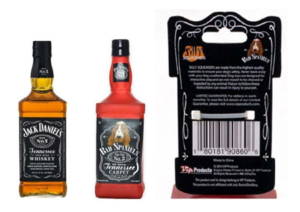On June 8, 2023, the Supreme Court of the United States issued a unanimous decision in the case of Jack Daniel’s Properties, Inc. v. VIP Products LLC, No. 22-148, 599 U.S. ___ (2023), ruling that when an alleged infringer uses a mark as a trademark to designate the source of its own goods, the Rogers test providing First Amendment protection for titles of artistic works does not apply to shield the challenged use from liability for trademark infringement, nor do the noncommercial use and fair use exclusions under the Lanham Act apply to foreclose dilution liability.
Jack Daniel’s makes and sells whiskey using the bottle design and label shown below, which are trademarks of Jack Daniel’s and are covered by several trademark registrations, including “Jack Daniel’s,” “Old No. 7,” the arched Jack Daniel’s logo, the stylized label with filigree (twirling white lines) and the distinctive square bottle design. VIP Products is a dog toy company that makes a line of chewable rubber toys called “Silly Squeakers,” many of which are designed to look like and parody popular beverage brands. Jack Daniel’s found no humor when VIP Products added the “Bad Spaniels” toy to its line (shown below), which is about the same size and shape as a bottle of Jack Daniel’s whiskey and uses the words “Bad Spaniels” in place of “Jack Daniel’s” in a similar font and arch, uses a similar black label and filigreed border, replaces “Old No. 7 Tennessee Sour Mash Whiskey” with “The Old No. 2 On Your Tennessee Carpet” and substitutes “43% poo by vol.” and “100% smelly” for “40% alc. by vol. (80 proof).” VIP’s Bad Spaniels product is packaged for sale with a hangtag (shown below) bearing two logos, one for Silly Squeakers and one for Bad Spaniels, and includes a disclaimer that the product is not affiliated with Jack Daniel Distillery.

